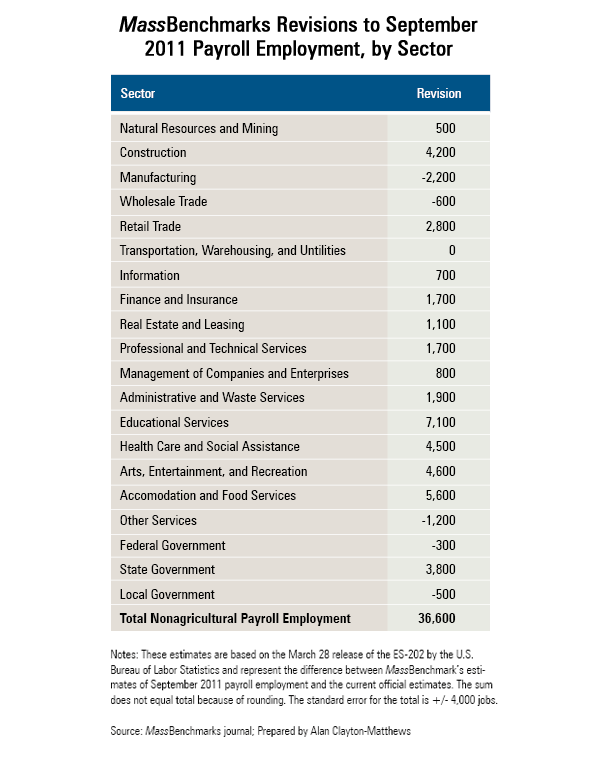
| Newly Released Data Change Our Understanding
of the Bay State's Job Growth in 2011...Again |
| Official revisions appear to significantly underestimate job growth, UMass journal reports |
New Massachusetts payroll employment data (ES-202) for the third quarter of 2011 was released on March 28th, providing the first available Unemployment Insurance (UI) based job counts for July-September 2011, as well as minor revisions to job counts in the first six months of 2011. Unlike the sample-based estimates they will replace when the official data are revised next March (2013), these data effectively represent a census of Massachusetts employers who are participants in the state's UI system and are much more reliable than previous estimates.
The implications of these new data for our understanding of job growth in the third quarter of 2011 are just as dramatic as those described by the "official revisions" released on March 8th, but in the opposite direction.
While these newly released data will not be incorporated into the "official estimates" by the US Bureau of Labor Statistics (BLS) until next March, MassBenchmarks has utilized a simplified version of BLS's re-benchmarking process to estimate what the revised CES-790 job counts would be for January-September 2011 if the BLS were to incorporate this new information today. For a description of the methodology used to prepare these estimates, please visit massbenchmarks.org/news/01_data_revisions/data_revisions.htm.

The official, post-benchmark sample based job estimates currently report that in the third quarter of 2011, employment in Massachusetts declined from 3,209,200 in June 2011 to 3,205,000 in September 2011, a loss of 4,200 jobs. In stark contrast, we now estimate that employment appears to have increased by 26,100 jobs during this same period.
These new estimates of job growth in the third quarter of 2011 suggest that during the first nine months of 2011 (from December 2010 to September 2011), Massachusetts added 38,900 jobs rather than the BLS' official estimate of 2,300. This means that we now estimate the number of jobs in September 2011 to be 36,600 more than the current official estimate for that month (and 13,100 more than the pre-revision official estimates).

"Given the problems faced by the monthly payroll survey in accurately measuring employment trends, and the large revisions in job counts, it is important to incorporate accurate information into our understanding of employment trends when it becomes available. At least for the first three quarters of last year, the pace of job creation appears to have accelerated moderately from 2010," noted MassBenchmarks Senior Contributing Editor and Northeastern Professor Alan Clayton-Matthews, who prepared the new estimates.
During 2010, from December 2009 to December 2010, the number of payroll jobs expanded by 1.1 percent. For the first three quarters of 2011, from December 2010 to September 2011, the number of jobs now appears to have grown at a 1.6 percent annualized rate.
"Given the fluctuations in the BLS' sample based estimates for estimating historical employment growth in Massachusetts, and the need to have the best and most timely information possible to track the state's economy, MassBenchmarks will again re-estimate employment growth for all of 2011 once the fourth quarter 2011 ES-202 data are released on June 28th," said Martin Romitti, MassBenchmarks Managing Editor and Director of Economic and Public Policy Research at the UMass Donahue Institute.
For more insight and analysis of the Massachusetts economy, please check out the latest issue of MassBenchmarks, available online at: https://massbenchmarks.org/publications/massbenchmarks.htm.
![]()
For more information please contact:
Dr. Alan Clayton-Matthews |
Dr. Martin Romitti |
|
Dr. Robert Nakosteen
|
|
Dr. Michael Goodman |
![]()